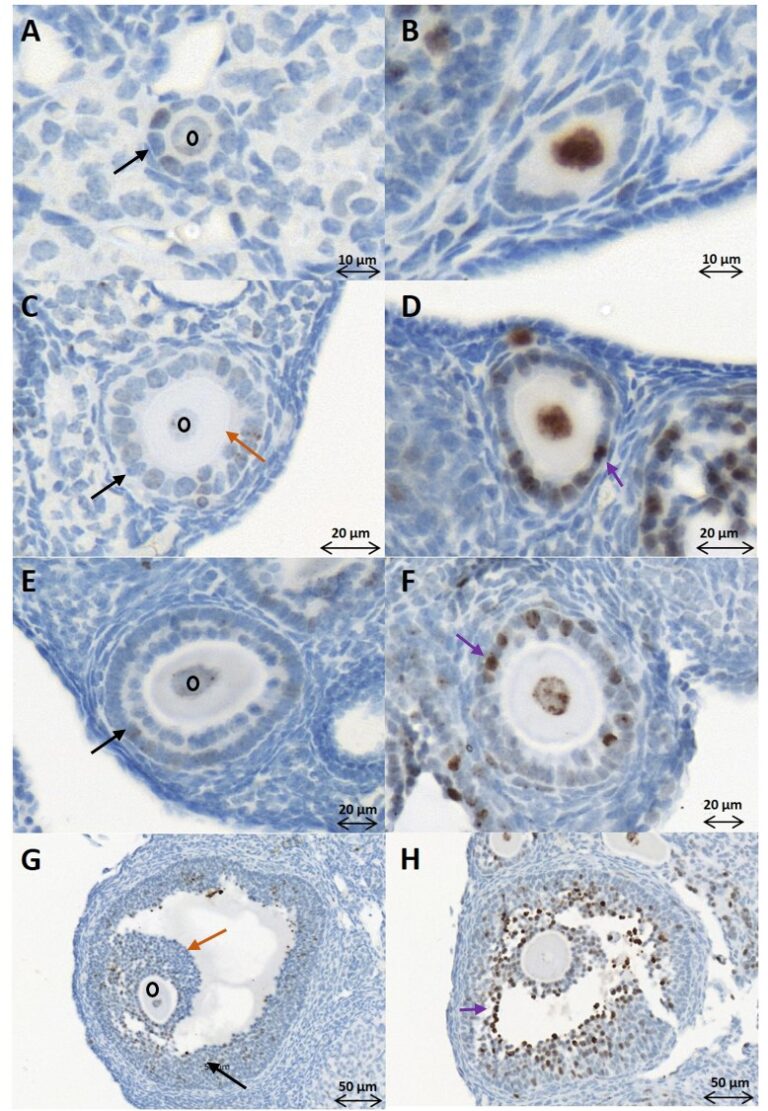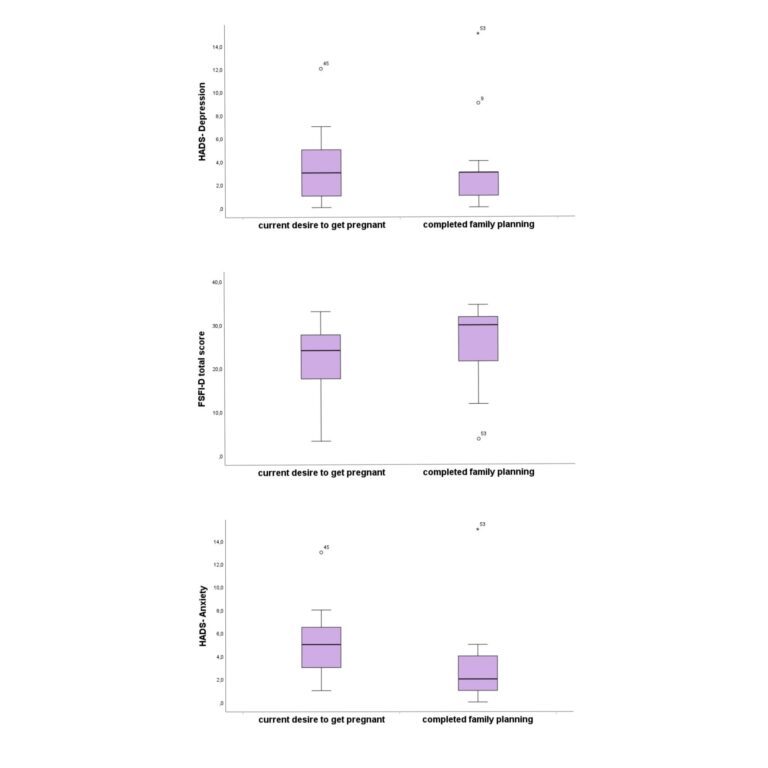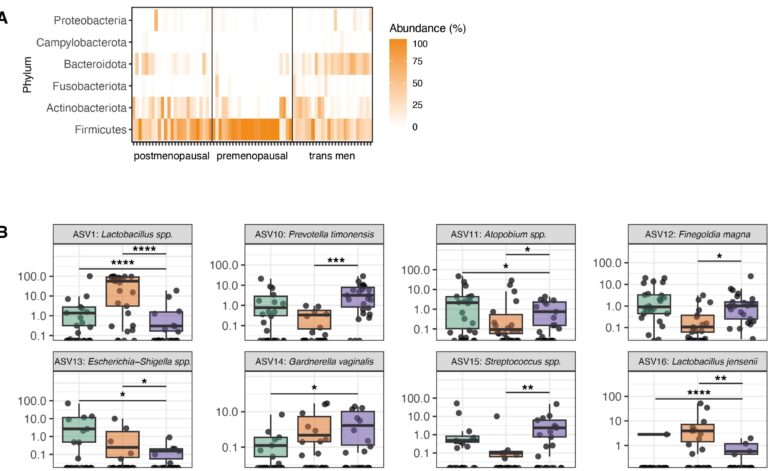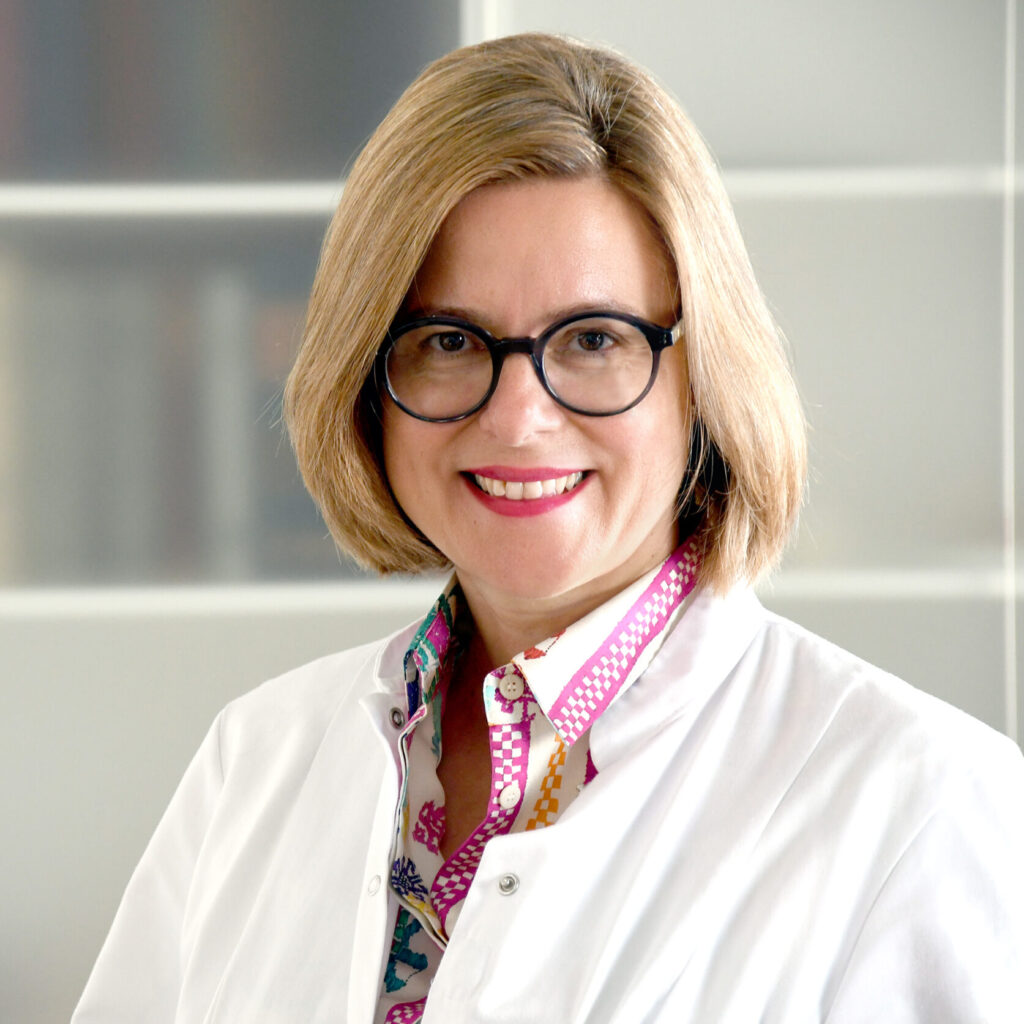
Anichstraße 35
6020 Innsbruck
Fax: +43 (0)50 504 23277
Email: Bettina.Toth@i-med.ac.at
Website: https://kinderwunsch.tirol-kliniken.at/page.cfm?vpath=index
Research year
Research Branch (ÖSTAT Classification)
302022, 302089, 305902
Keywords
biomarkers of reproductive diseases, early pregnancy, endometriosis, fertility preservation, gender identity disorders, gynaecological endocrinology, PCOS, recurrent implantation failure, recurrent miscarriage, reproductive immunology, and Reproductive medicine
Research Focus
Our research focuses on the physiology and pathology of ovarian and uterine function as well as reproductive immunology, particularly on:
- Early and recurrent pregnancy loss and recurrent implantation failure
- Immune tolerance and implantation
- Fertility preservation
- Endometriosis
- Gynaecological endocrine disorders
- Contraception
- Disturbances of gender identity
- Biomarkers of male and female fertility
General Facts
The research unit is structured around the laboratories in the Innrain interdisciplinary facility and in the clinical unit of Gynaecological Endocrinology and Reproductive Medicine. We perform translational research with the aim of applying results to the clinical care of patients and are undertaking clinical studies. Our clinical outpatient services have more than 20,000 annual patient contacts for endocrine and fertility-related disorders. The Department is the coordinating site of the SEF/EEL-certified clinical-research endometriosis centre, the fertility preservation centre of the FertiProtekt Network and the hormonal centre of Transgender Center Innsbruck (TCI). We perform over 500 stimulated and natural-cycle IVF/ICSI cycles and more than 350 frozen embryo transfers per year. We also offer oocyte, sperm, embryo and ovarian tissue cryopreservation for patients facing loss of fertility as a result of autoimmune and malignant diseases. The IVF laboratory routinely performs embryo culture and cryopreservation as well as trophectoderm biopsies for pre-implantation genetic testing and works hand-in-hand with our research unit. We work closely with a number of clinical and scientific units of the Medical University of Innsbruck and with international research partners. We participate in the fellowship programme sponsored by the European Society of Human Reproduction and Embryology (ESHRE) for subspecialty training in reproductive medicine. Many members of our Department hold leadership positions on academic boards, coordinate and serve on international practice guideline committees or are members of academic journal editorial boards. Since 2022, Professor B. Toth has been President of the Austrian College of Obstetrics and Gynaecology.
Research
Projects on fertilization and infertility
Studies on fertility are translating basic scientific research to clinical care and highlight the collaboration between our research laboratory and the clinical division.
The Klotho protein, a biomarker for ovarian reserve, oocyte quality and fertilization rate in patients with and without PCOS
E.Reiser, M. Frank, L. Lang, B.Toth
We are examining the function and regulatory mechanisms of the Klotho protein and its subforms, with a focus on their role in complex endocrine disorders such as polycystic ovary syndrome (PCOS) and the associated impairment of fertility. Given Klotho’s multifaceted influence on metabolic regulation—particularly its interaction with growth factors such as FGF19 and FGF21, which have a pivotal role in glucose and lipid metabolism and significantly impact the neuroendocrine control of fertility—we are aiming to develop more targeted treatment approaches. We also hope to provide insights into PCOS-related hyperandrogenemia, granulosa cell apoptosis, insulin resistance, and anovulation.
Composition and function of extracellular vesicles in peripheral blood, seminal plasma and follicular fluid in ART patients
Toth, S. Tröger, M. Niederwanger
This study represents a progression of research initiated by our group, as evidenced by publications including “Procoagulant tissue-factor-exposing vesicles in human seminal fluid” and “Extracellular vesicles in human follicular fluid do not promote coagulation.” The present work is delving into the physiological underpinnings of the anticoagulatory properties of extracellular vesicles found in follicular fluid, along with the procoagulatory characteristics of EVs in seminal plasma. We are focusing on couples undergoing ART, with either the male or female partner exhibiting infertility factors. In collaboration with the Laboratory of Experimental Clinical Chemistry at the Amsterdam University Medical Center, we are investigating gender-, age- and infertility disorder-specific differences in EV composition and function.
The effect of environmental heavy metals on fertility maintenance mechanisms
Niederwanger, B. Toth
The progressive decline of fertility rates worldwide is largely attributable to environmental pollutants and may be due to impaired gonadal development and function, as well as to disturbed ovulation, steroidogenesis, reproductive hormone balance and fertilization rate. We posit that contaminants negatively affect fertility by reducing the protective effects of proteins associated with the reproductive process and are studying toxicological effects on the reproductive system in animal models with advanced evolutionary adaptations to metal stressors. Our objectives are threefold: to identify, characterize, and analyse novel proteins; to perform metal exposure experiments; and to evaluate the potential of animals as a source of ideas on how fertility-preserving mechanisms in animal models could help humans survive the escalating environmental pollution of the next decades.
Role of dendritic cells in immune tolerance and early implantation failure
Toth
Dendritic cells (DC) are critical immune cells at the heart of the delicate balance that allows embryo implantation and the establishment of immune tolerance towards the developing foetus. Disruption of their function could lead to complications, such as implantation failure or early pregnancy loss. Our results indicate that pre-implantation embryos can affect the maternal immune system and actively influence their fate.
Recurrent pregnancy loss, recurrent implantation failure
B.Toth, AS. Braun, AL. Zippl, C. Eftekarian, S.Schuchter, H.Welponer,
We are focusing on the identification of novel risk factors for recurrent pregnancy loss (RPL) and recurrent implantation failure (RIF), conditions whose aetiology remains elusive in approximately 50% of affected patients. We are focusing on lymphocyte subpopulations such as Treg, dendritic and NK-cells and on their interaction with the foeto-maternal interphase, as well as on the uterine microbiome. We are also studying the role of coagulation disorders and elevated lipoprotein(a) levels in the context of pregnancy loss. Our clinical studies are correlating diagnostic factors and applied treatment strategies to pregnancy outcomes and evaluating whether compliance with recommended therapies improves pregnancy outcomes. We are also studying psychological aspects and sexual satisfaction in affected individuals.
Early pregnancy
B.Seeber, A.Zippl, E. Reiser
Pregnancies following IVF have a higher risk of complications associated with placentation problems, including pre-eclampsia, premature delivery and newborns that are small for gestational age. We recently completed and published a clinical study that identified a high concentration of first-measured hCG following embryo transfer as a risk factor for pre-eclampsia. We are currently collaborating with other IVF centres in Austria and abroad to validate the findings.
In additional work on early pregnancy, we have evaluated the success rates of medical management of early pregnancy failure, reporting a high rate of success of 89%, independent of mode of conception (unassisted vs IVF, fresh and frozen ET).
Endometriosis
B.Seeber, A. Zippl, E. Reiser, C. Eftekarian
Our clinical and research Endometriosis Centre has been certified since 2017 and leads multiple inter-disciplinary projects in collaboration with the Department of Radiology and the Institute of Clinical Epidemiology, Health Economics and Medical Statistics at the MUI. Our Centre is taking part in multi-centre international studies on the aetiology of endometriosis symptoms and the outcomes of medical and surgical treatments, leading to multiple publications We are the principal investigation centre for an ongoing multi-centre study correlating patients’ symptoms and quality of life (QOL) to the localization of endometriosis lesions. We are also evaluating predictive models for early disease, correlating mode of delivery and QOL and studying gastrointestinal symptoms in deep infiltrating disease.
Adenomyosis and immunological disorders
A.Zippl, B.Seeber, B. Toth
Our investigator-initiated projects are evaluating embryo implantation problems in women with endometriosis and adenomyosis, focusing on immunological alterations. We have studied the effects of GnRH agonist treatment before embryo transfer on lymphocyte subpopulations in the endometrium and peripheral blood of women with adenomyosis. We found a high prevalence of uNK cells in women with endometriosis and a significant decrease in the percentage of classical monocytes after treatment with GnRH agonists. Further studies on the uterine microbiome in patients with adenomyosis before and after GnRH agonists are ongoing.
Gynaecological endocrinology
B.Böttcher, H. Welponer, B.Seeber, B.Toth
Our endocrinology outpatient clinics treat adolescents and women with common hormonal disorders, especially PCOS and anovulatory conditions, premature ovarian insufficiency and gynaecological disorders of children and adolescents. We have designed and are conducting a prospective cohort study on the correlation between hormonal contraceptives and depression. Additional research is focused on the effects of hormonal contraceptives and hormone replacement therapy on specific aspects of health and quality of life. We recently extended our focus to the treatment of problems pertaining to the peri-menopausal transition and to menopause.
Fertility preservation
B.Böttcher, E.Reiser, M.Frank, B.Toth
As a member of the FertiProtekt Network, our Clinic offers possible fertility preservation strategies to women who are affected by cancer. These include GnRH analogues, cryopreservation of oocytes and/or embryos and cryopreservation of ovarian tissue followed by auto-transplantation after finishing the oncological treatment. The Department was the first centre in Austria to perform ovarian tissue cryopreservation and to report a live birth after transplantation. Recently, the FertiTox study – an international multicentre study with over 70 participating centres – was initiated to analyse the long-term impact of gonadotoxic medication on female and male fertility. We have conducted and recently published a study of sexual function and mental health in affected women, the results of which are depicted in Figure 1.
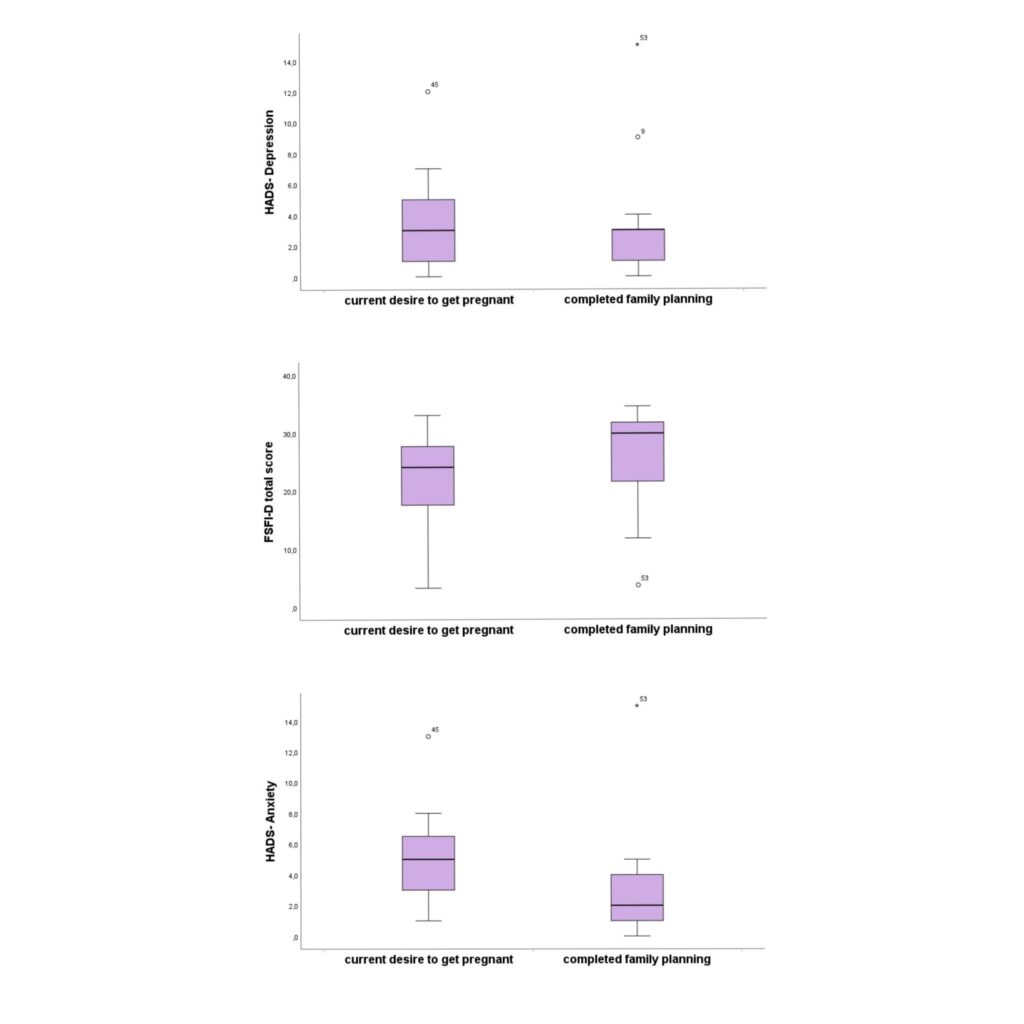
Damage to mouse/human ovary by low dose radiation
Reiser, M. Niederwanger, M.Frank, B. Toth
Fertility preservation in children and young women undergoing radiation remains an unmet clinical need with a lack of research on radiation-induced ovarian damage, especially from low dose or stray radiation. We seek a better understanding of the factors that regulate radiation-induced damage to the ovarian stroma cells, taking into account the radiation dose.
Supported by a MUI Start grant, we have continued an in vivo project in mice to gain insights into the effects of low-dose radiation doses between 0.5 and 4.5 Gy on ovarian tissue at different time points of follow-up. Using immunohistochemistry and FACS analysis, we measured changes to the number of follicles and immune cell numbers, as well as markers of cell damage (apoptosis, oxidative stress, DNA damage). In total, 2% immune cells were detectable within the mouse ovaries, mainly consisting of natural killer (NK) and T cells. Experimental results are shown in Figure 2.

Transgender persons and non binary persons
K.Feil, S.Schuchter, B.Böttcher, B.Toth
Transgender and gender diverse (TGD) individuals show a discrepancy between their sex assigned at birth and their experienced gender. Our Department offers gender-affirming hormone therapy to adolescents and adults, namely trans women and girls, trans men and boys and non-binary persons. In collaboration with the Department of Psychiatry, Psychotherapy, Psychosomatics and Medical Psychology (DPPPMP), we recently completed a study of adverse childhood experiences (ACE) in transgender persons compared to cisgender persons. TGD persons reported a significantly higher number of ACEs than cisgender patients, with substantial differences as early as five years of age. In collaboration with the DPPPMP, we have developed and validated a questionnaire to determine health-related quality of life in TGD persons (iTransQoL) and have used it to investigate the coming-out processes in TGD people.
Additional research collaborations include a study on adherence to hormone therapy in TGD adults starting hormone therapy as adolescents (Department of Child and Adolescent Psychiatry); an investigation of the effects of testosterone treatment, which showed that the vaginal microbiome of trans men differs from that of premenopausal women but has similarities to that of menopausal women, a finding that may be relevant to the risk of contracting STIs (Department of Internal Medicine 2 and the Department of Obstetrics and Gynaecology). Results are summarized in Figure 3.
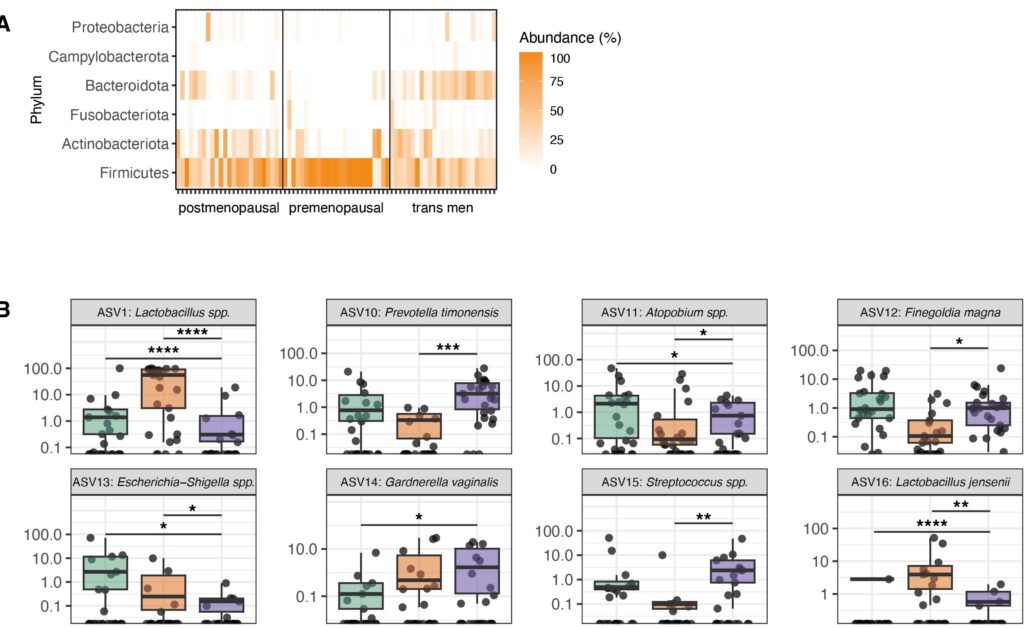
; a study of bone health in TGD adolescences and adults (Department of Gyanecology and Pathophysiology of Human Reproduction, IRCCS University Hospital of Bologna); and an investigation of the influence of transitioning on the processing of linguistically perceived emotion in transgender women (Laboratory for Cognitive Neuroscience).
Pictures
Selected Publications
- Braun, A. S., Vomstein, K., Reiser, E., Tollinger, S., Kyvelidou, C., Feil, K., & Toth, B. (2023). NK and T Cell Subtypes in the Endometrium of Patients with Recurrent Pregnancy Loss and Recurrent Implantation Failure: Implications for Pregnancy Success. Journal of clinical medicine, 12(17), 5585. https://doi.org/10.3390/jcm12175585
- Reiser, E., Böttcher, B., Ossig, C., Schiller, J., Tollinger, S., & Toth, B. (2024). Female cancer survivors: sexual function, psychological distress, and remaining fertility. Journal of assisted reproduction and genetics, 41(4), 1057–1065. https://doi.org/10.1007/s10815-024-03051-7
- Colleselli-Türtscher, V., Hafenmayr, M., Ciresa-König, A., Trinker, M., Maier, S., Toth, B., & Seeber, B. (2024). Retrospective cohort study comparing success of medical management of early pregnancy loss in pregnancies conceived with and without medical assistance. Fertility and sterility, 121(5), 824–831. https://doi.org/10.1016/j.fertnstert.2024.01.011
- Feil, K., Pabst, L., Reider, S., Schuchter, S., Ciresa-König, A., & Toth, B. (2024). The vaginal microbiome of transgender men receiving gender-affirming hormonal therapy in comparison to that of cisgender women. Scientific reports, 14(1), 21526. https://doi.org/10.1038/s41598-024-72365-4
- Kyvelidou, C., Haselrieder, S., von Gierke, M., Gostner, J. M., Biasio, W., Wirleitner, B., Heufler, C., Toth, B., & Hofer-Tollinger, S. (2024). Dendritic cells under the control of the preimplantation embryo secretome: an in vitro study. Reproductive biology and endocrinology : RB&E, 22(1), 150. https://doi.org/10.1186/s12958-024-01319-2
Selection of Funding
- FWF P 33249-B (S.Tollinger): Humanes Embryokulturmedium und dendritische Zellen
- Medizinischer Forschungsfonds Tirol (MFF) (A.L. Zippl): Impact of GnRH agonist treatment on immune cell populations in women with adenomyosis
- MUI Start (E. Reiser): Fertility Protection: Understanding the cellular and molecular mechanisms that underlie radiation-induced ovarian damage
Industry-Sponsored Clinical Studies
- OASIS: Phase-III-Study (Bayer AG) evaluating the efficacy and safety of elinzanetant for the treatment of vasomotor symptoms in menopause.
- AGNOMED: Study evaluating the effects of Agnucaston (Bionorica) on dysmenorrhea in a double-blind placebo-controlled study
Collaborations
- Doz. Dr. Emilia Solano, Laboratory for Translational Perinatology- Focus: Immunology, Chair of Obstetrics and Gynecology, focus: Obstetrics, University Hospital Regensburg- St. Hedwig Clinic, Germany
- Udo Markert, Placenta-Labor, Universitätsklinikum Jena, Jena, Germany
- Dr. Dr. Ruben Kuon, Department of Gynecological Endocrinology and Fertility Disorders, Heidelberg University Hospital, Im Neuenheimer Feld 440, 69120, Heidelberg, Germany
- Rienk Nieuwland, UMC Research Institutes, Amsterdam, Netherlands
- Network of Certified Endometriosis centers throughout German-speaking countries (Stiftung Endometriose Forschung)
